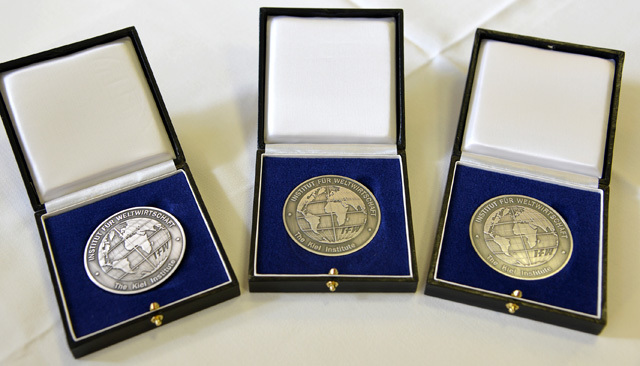Research Prizes & Awards
Every two years, the City of Kiel recognises special scientific achievements by awarding the Kiel Science Prize. Since 2017, this award has been complemented by the Innovation Prize. Both these prizes are endowed with EUR 10,000.
Every year, the Global Economy Prize is used to honour outstanding figures from the worlds of politics, industry and science who have made a special contribution to a socially responsible society based on individual responsibility.
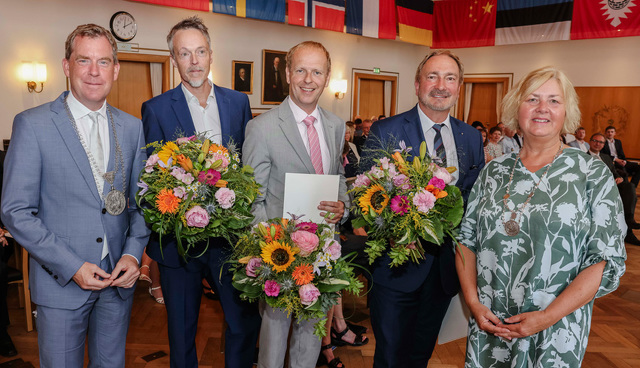
Kiel Science Prize:
Prof.Dr. Hinrich Schulenburg – Evolutionary ecologist and geneticist at the CAU
in a video interview (german)
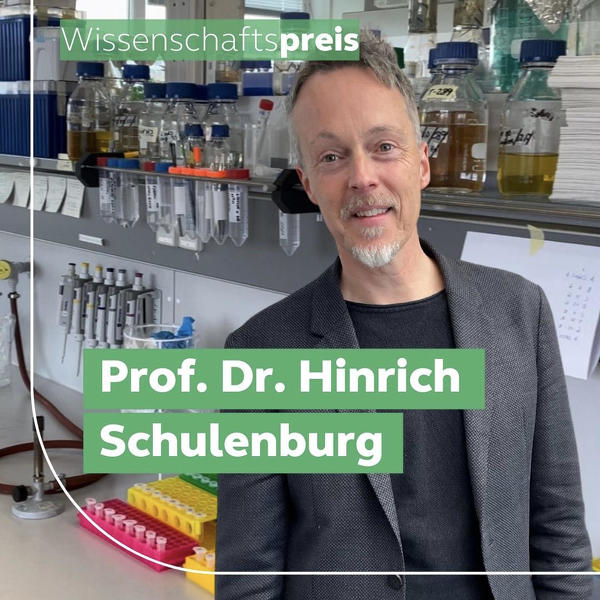
Professor Hinrich Schulenberg has been Professor of Zoology at the CAU since 2008 and heads the "Evolutionary Ecology and Genetics" working group at the Zoological Institute. He is one of the leading experts in this field, and his reputation extends far beyond Germany.
Schulenberg's research interests relate to the process of evolution, including the underlying ecological and genetic mechanisms. At the CAU, he heads the Kiel Evolution Center and the Research Training Group (RTG) Translational Evolutionary Research (TransEvo). Schulenburg's special areas of interest are scientific communication and dialogue with society.
What brought you to Kiel?
In 2008, I accepted the offer of a professorship in biology at Kiel University. The framework conditions in Kiel are fantastic for me. These include the priority research areas at Kiel University as well as at the partner institutions, in particular the Max Planck Institute for Evolutionary Biology in Plön and GEOMAR.
I also like the north of Germany, the wind, the sea on my doorstep, sailing, the northern German mentality, the dry humour. All in all, it’s a perfect fit.
What exactly do you do?
I am an evolutionary biologist and am fascinated by the processes that cause organisms to change over time.
In teaching, I try to inspire the students to be interested in evolution, especially since it is a topic that combines diverse areas of biology and thus provides a framework for biology as a whole. In research, I investigate the evolution of antibiotic resistance in my working group, as well as the interaction of organisms with their tiny fellow residents, the so-called microbiome.
What is the significance of your research for society?
My working group conducts research on two cutting-edge topics: antibiotic resistance and host-microbiome interactions. Our research on the evolution of antibiotic resistance provides new ideas for improved treatments against pathogens.
The global spread of antibiotic resistance is currently one of the biggest threats to human health. Our research results show ways in which we can sustainably combat pathogens with the existing antibiotics and at the same time keep the spread of resistance in check.
On the other hand, our research into the microbiome provides new insights into the influence of microbes on our health. This influence of the microbiome is enormous and was completely unknown just a few years ago. We now know that the microbiome can help to fight pathogens or increase tolerance to environmental stress.
What does the Kiel Science Prize mean to you?
I was absolutely delighted to receive the prize from the city: It is special recognition for the research of my working group, which has been exploring the secrets of evolution with great enthusiasm and skill for over ten years. In addition, I am pleased that it is the prize of my favourite city Kiel!
What are your hopes for the future of Kiel?
A lot of wind! And a continuation of the great openness to the world, in particular tolerance and curiosity for what is different, and thus also for the diversity that makes us all unique. Ultimately, this is also the basis for Kiel to remain an exciting place for world-class research.
Kiel Innovation Prize:
Prof.Dr. Anton Eisenhauer and RNDr. Stefan Kloth – osteolabs GmbH
in a video interview (german)
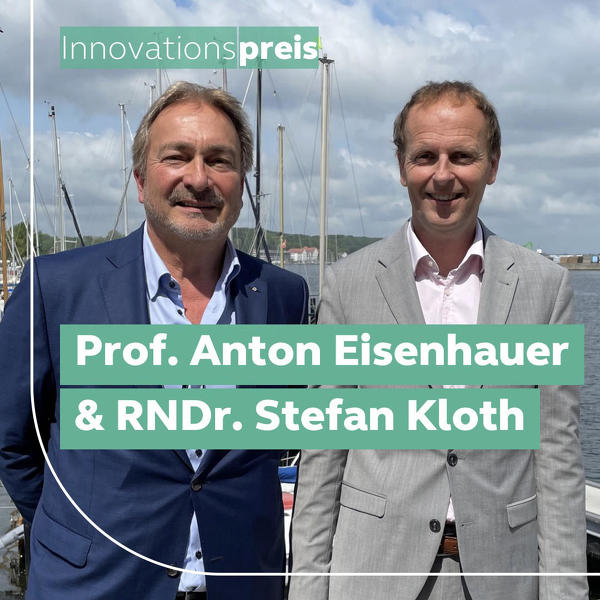
Osteoporosis is a widespread disease that Professor Anton Eisenhauer and RNDr Stefan Kloth focus on with their company osteolabs GmbH. They market an innovative, non-invasive early detection test, which only requires blood and urine for analysis.
The basis of the tests is derived from the coral research of GEOMAR. The idea of using instrumental-analytical technologies from marine research in medicine is revolutionary. Thanks to this method, which was developed in Kiel, osteoporosis can be detected and treated years earlier than with the standard procedures used previously.
What brought you to Kiel?
Actually, I was born in Bavaria, specifically Franconia (Röttingen (Ufr.)), and I grew up in a small town in northern Württemberg, in beautiful Weikersheim. At the Weikersheim Gymnasium grammar school and through the teaching of dedicated teachers, I discovered my passion for physics and mathematics.
After the end of my three-year military service in 1982, I decided to study physics and mathematics in Heidelberg. I completed my studies with the state examination in 1986 and then received my doctorate in physics in 1989.
At the Institute of Environmental Physics and the Heidelberg Academy of Sciences and Humanities, I took my first steps in research and came into contact with GEOMAR in Kiel, which was newly founded at the time. However, in 1990 I initially accepted a senior researcher position at the renowned California Institute of Technology (Caltech) in Pasadena, California, USA, where I was offered the best research opportunities.
These post-doc times in the vicinity of Los Angeles, close to the Pacific, the conversations with my boss Jerry Wasserburg at the Division of Geological and Planetary Sciences, as well as meetings with subsequent Nobel Prize laureates such as Sherwood Rowland and Paul Crutzen, remain fond memories to this day and have significantly influenced my scientific career.
Although I had an offer to stay on at Caltech, I returned to Germany for family reasons. In 1995, I accepted a research assistant position at the Institute for Geochemistry at the University of Göttingen, to complete my habilitation and to develop physical isotope methods for the reconstruction of past environmental and climate data from marine sediments, also in cooperation with GEOMAR.
A great reward and honour was that I received the Goldschmidt Prize for this work in 1997, and in 1998 I also accepted an appointment as Professor of Marine Geochemistry at Kiel University and GEOMAR. Since then, I have been conducting research at GEOMAR in cooperation with its outstanding scientists, utilising the best technical/analytical opportunities, while enjoying a high degree of scientific freedom.
What exactly do you do?
At GEOMAR, I lead a working group that reconstructs past climate and environmental data using modern instrumental methods, with the help of innovative mass spectroscopy. This is necessary if one wants to understand the climatic development of the planet in general and that of the oceans in particular, i.e. to know, for example, what the temperature or acidity of the sea was in the past, such as 1,000, 10,000 or even 100,000 years ago, with a high degree of precision.
Analogous to a traditional library, where all information is stored in books, the climate and environmental information of the past is stored in marine geoarchives such as sediments, rocks and corals. By measuring these relationships and applying certain mathematical algorithms, we can transform this chemical information into information about the temperature and acidity of the seawater of the past, which is then available to climatologists and geologists for further interpretation.
In recent years, through the application of trace metal and isotope methods, we have achieved successes in areas such as the reconstruction and determination of the causes of sea level fluctuations since the last ice age, the consequence of which are also of particular importance for Schleswig-Holstein. A significant interest in recent years has also been the increasing use of methodical work on corals as temperature archives, through our trace element and isotope methods - especially from calcium isotope ratios - in order to obtain information about the influence of sea temperature on the ability of corals to calcify. This is important work in order to understand how the development of reefs will be impacted by rising sea temperatures.
Very soon, I understood that the application of marine trace metal and isotope methods also has a dual nature and allows applications in marine geochemistry, but also in medical diagnostics. With the help of my working group and especially in collaboration with physicians from the UKSH, a method and a test could be developed and patented, which today very successfully detects calcium deficits in the human body and can be used for the early detection of osteoporosis, years before the traditional methods can do so.
This has led to the spin-off of the company osteolabs GmbH at Seefischmarkt in Wellingdorf, from where it commercialises the test based on calcium isotope measurements. Through the close cooperation with physicians, I have also recognised that in general, analytical/instrumental methods of marine chemistry can also be applied in medical diagnostics, and they have the potential to be more sensitive than the traditional medical diagnostic methods.
In cooperation with the UKSH, Kiel University and the company Stryker Trauma GmbH, this finding led to our BlueHealthTech project, funded by the Federal Ministry of Education and Research, which now systematically transfers marine instrumental/analytical methods to medicine in a technology transfer process using a cross-disciplinary approach.
What is the significance of your research for society?
I consider the work of my working group and I to be of great importance to society, as on the one hand, our work contributes to a better understanding of the development of climate and the environment, which in turn contributes to ever-improving models for the climatic development of our planet.
And on the other hand, as part of our fundamental research on corals, we have initiated innovative technical developments that are interesting in a "dual" approach for other fields of science, especially in medicine, and that will make a future contribution to practical benefits for society, improved health and a reduction in costs in the healthcare system.
What does the Kiel Innovation Prize mean to you?
I am delighted to receive the prize, and it is wonderful recognition for the research carried out at GEOMAR in recent years. However, I would like to emphasise that modern research is always a team effort, and that many other dedicated scientists and other employees have contributed to this success.
The Kiel Innovation Prize will certainly contribute to the fact that our approach to dual use of marine methods and instrumental analysis in medicine will receive greater attention. In particular, I hope it will be recognised that the cooperation between medicine and marine research is a unique selling point in Kiel and this can be a lighthouse project for current research along the fjord.
The close combination of medicine at the UKSH with the marine sciences at Kiel University and GEOMAR is a unique constellation that can only be implemented in this way in Kiel and along the fjord. This cooperation has already borne fruit through the BlueHealthTech project. The prize will draw even more attention to the BlueHealthTech project, which I associate with my hope to be able to attract even more research institutions and also companies from the region to participate in the project.
What are your hopes for the future of Kiel?
My wish for the City of Kiel is that it will embrace its maritime character as a gateway to the Baltic Sea, to Scandinavia and to the Baltic States even more enthusiastically than it already does, and see this as an opportunity for sustainable development.
In addition, I hope that the citizens of Kiel will recognise the unique selling point of interdisciplinary cooperation between outstanding medical and marine science research, and that Kiel will thus develop into a start-up city for new products, processes and services for the maritime economy and for the medicine of the future.
What brought you to Kiel?
I have always been a true Schleswig-Holsteiner - except for semesters spent abroad during my studies and doctoral research and my first job in Hamburg - so nothing has brought me here, but rather I have decided to stay here.
What exactly do you do?
I found technology and e-commerce companies, like to work with universities and research institutions, and commercialise and market the technology they develop. In this respect, I am what one could call a serial entrepreneur. osteolabs is my fourth start-up as a co-founder. My first start-up was the company Lenscare, which is still located in the Science Park on Westring and which markets contact lenses via e-commerce. I was 24 years old when it was founded. So a really young entrepreneur.
Today at osteolabs we are focussed on the early detection of osteoporosis. This widespread disease is often underestimated, and it is not anchored in the awareness of many people. Unfortunately, many of those who suffer from osteoporosis do not receive sufficient support - one can actually speak of a lack of healthcare for the disease. We want to change this. To do so, we need communication measures in order to get this into the minds of the population and the decision-makers. Due to my dual role as a businessman and physicist, I see myself in a position – as with all my start-ups – to understand technical facts and to present them in a comprehensible manner.
What is the significance of your research for society?
The importance of our work lies in the early detection of osteoporosis and thus in the possible earlier treatment of disease progressions. This means that we benefit society, by helping to reduce the number of people suffering from osteoporosis in the future and thus reduce the number of osteoporosis-related bone fractures. In addition to the social benefit, there is a financial benefit for the health insurance companies.
What does the Kiel Innovation Prize mean to you?
When Mr Tovar called me in the evening after the Kiel City Council meeting, I was very surprised! I did not expect it at all. Naturally, I am delighted about this prize, and I am proud that as a prize winner, I can represent the City of Kiel all over the world, e.g. in San Francisco in future.
And naturally, it is very helpful for my further, planned start-ups to have received such a prize, because it also helps convince investors to provide venture capital due to the reputation boost. Of course, these start-ups are planned in Kiel!
What are your hopes for the future of Kiel?
An even more innovation-friendly environment, better networking of stakeholders and institutions that support start-ups, an extremely successful start-up to serve as a role model - also known as a unicorn in the start-up scene - as an example for potential founders, more in-depth cooperation with stakeholders in Hamburg, and last but not least, that Kiel remains a liveable, economically attractive city and develops further towards a "smart city".
Honouring outstanding scientific and innovative achievements
The City of Kiel honours individuals, groups and institutions with a particular connection to Kiel or Schleswig-Holstein in their work and who have made outstanding achievements within and beyond the region.
The Kiel Science Prize was first awarded in 2001 to the pathologist and anatomist Prof. Karl Lennert, who was also the recipient of numerous honorary doctorates. Since then, it has been conferred every other year, alternating with the traditional Kiel Culture Prize, which was first awarded back in 1952.
Since 2017, the Science Prize has been complemented by the Innovation Prize for outstanding discoveries and science-based start-up business models. The prize winners are proposed by the City of Kiel’s Kultur- und Wissenschaftssenat (Culture and Science Senate). The final decision on awarding the prizes is made by the Kiel City Council.
PREVIOUS AWARD WINNERS
Global Economy Prize
Together with the City of Kiel and Schleswig-Holstein's Chambers of Commerce and Industry (IHK), the Kiel Institute for the World Economy (IfW) has been awarding the Global Economy Prize since 2005.
It is used to distinguish influential representatives from the worlds of politics, industry and science who have made a special contribution to a socially responsible society based on individual responsibility.
The jury is made up of prize winners since 2005 and the President of the Kiel Institute for the World Economy. In 2023, the focus of the award was on development in Africa.
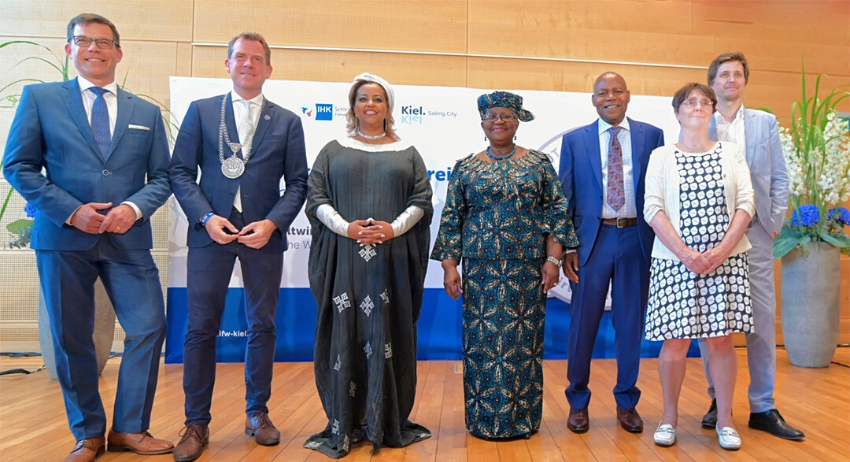
ALSO OF INTEREST
You can find a list of the previous award winners on the website of the IfW.
